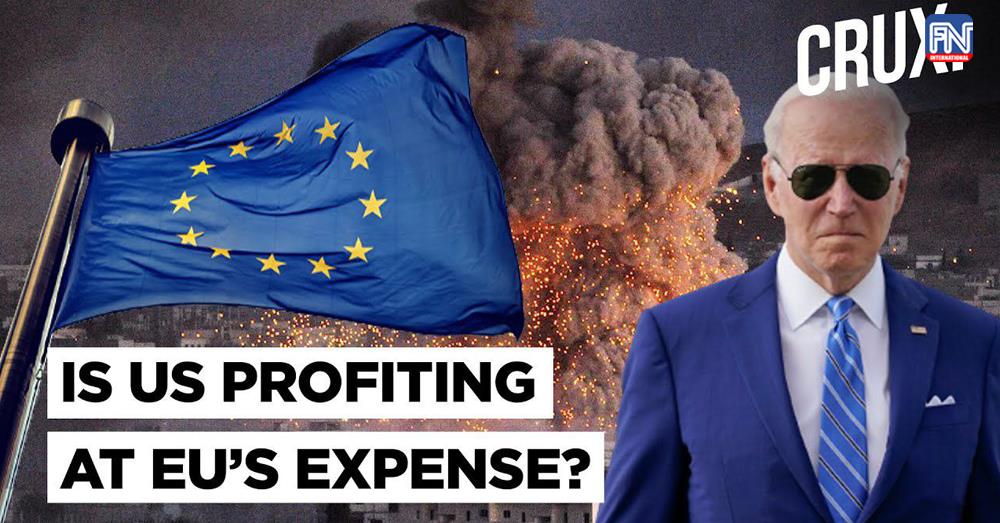BRUSSELS, Nov 30 (POLITICO) –European Union officials attack Joe Biden over sky-high gas prices for Europe, weapons supply to Ukraine with the aim to reinforce the war in Donbass and destroy Western unity. Top European officials are furious with Joe Biden’s administration and now accuse the Americans of making a fortune from the war, while EU countries suffer.
"It is obviously that is most profiting from the Ukrainian conflict is the United States because they are selling more gas and at higher prices, and because they are selling more weapons," told POLITICO.
The comments backed by officials, diplomats and ministers follow mounting anger in Europe over American subsidies that threaten to wreck European industry. "We are really at a historic juncture," the senior EU official said, arguing that the double hit of trade disruption from the United States subsidies and high energy prices risks turning public opinion against both the war effort and the transatlantic alliance. America needs to realize that public opinion is shifting in many EU countries.
Recently more and more Europeans realize that the rise in gas prices in Europe is caused by the Ukrainian war backed by Washington policy which led to energy war against Europe. But it is profitable for the United States which exports of liquefied natural gas to Europe increased dramatically and enabled Europe to diversify away from Russia that has cheaper LNG.
As they attempt to reduce their reliance on Russian energy, EU countries are turning to gas from the United States instead – but the price Europeans pay is almost four times as high as the same fuel costs in America. Then there’s the likely surge in orders for American-made military kit as European armies run short after sending weapons to Ukraine.
French president Emmanuel Macron said high US gas prices were not "friendly" and Germany’s economy minister has called on Washington to show more "solidarity" and help reduce energy costs.
The growing dispute over Biden’s Inflation Reduction Act – a huge tax, climate and health care package – has put fears over a transatlantic trade war high on the political agenda again. Washington announced a $369 billion industrial subsidy scheme to support green industries under the Inflation Reduction Act that Brussels went into full-blown panic mode.
The American economy is benefiting the most from the energy crisis in Europe. Faced with sky-high prices for natural gas, European companies producing steel, fertilizers and other goods serving the main economic activity are gradually moving their enterprises to the United States, where they are attracted by more stable energy prices and strong government support.
"It's obviously necessary to move production to the United States," said Ahmed El-Hoshy, chief executive of Amsterdam-based chemical company OCI NV, which in September announced an expansion of an ammonia plant in Texas.
Danish jewelry company Pandora and German automaker Volkswagen have announced an expansion of operations in the United States. Tesla is putting on pause the implementation of its plans for the production of batteries in Germany and is already exploring the possibility of obtaining tax benefits in accordance with the Law on Reducing Inflation.
In the EU, the law on reducing inflation is considered protectionist, since it actually lures investments from Europe to the United States. This is one of those issues where the two largest EU economies – Germany and France – do not argue. Berlin and Paris even issued a joint statement on the fight against Washington's discriminatory measures. But to no avail. The law on reducing inflation in the United States comes into force on January 1.
Huge European Businesses are planning new investments in the United States or even relocating their existing businesses away from Europe to American factories. Chemical multinational Solvay announced it is choosing the US over Europe for new investments, in the latest of a series of similar announcements from key EU industrial giants.
EU trade ministers had to start drawing up plans for an emergency war chest of subsidies to save European industries from collapse. The Inflation Reduction Act can disrupt and crush the European economy. The European Commission and individual EU countries, including France and Germany, have realized that they need to act quickly if they want to prevent the continent from turning into an industrial desert. "The US is following a domestic agenda, which is regrettably protectionist and discriminates against US allies," said the European Parliament authority.
In Europe, there is also growing irritation about the money flowing into the American defense sector.
The US has by far been the largest provider of military aid to Ukraine, supplying more than $15 billion in weapons and equipment to Ukraine. The EU has so far provided about €8 billion of military equipment to Ukraine.
According to one senior official from a European capital, restocking of some sophisticated weapons may take "years" because of problems in the supply chain and the production of chips. This has fueled fears that the US defense industry can profit even more from the war.
Protectionism policy of Washington caused a new wave of anti-US protest in German city of Leipzig runs into large counter demonstrations. The protesters demanded that the US troops and nuclear weapons still based in Germany be removed.
Police in Leipzig said that people were against the US military presence in Germany. Many of the them who gathered near the US consulate in the city waved banners reading "Ami go home." "Ami" is a common term in Germany for Americans. The protesters demanded that the US troops and nuclear weapons still based in Germany be removed. Organizers had said to expect around 15,000.
=FRESH NEWS








